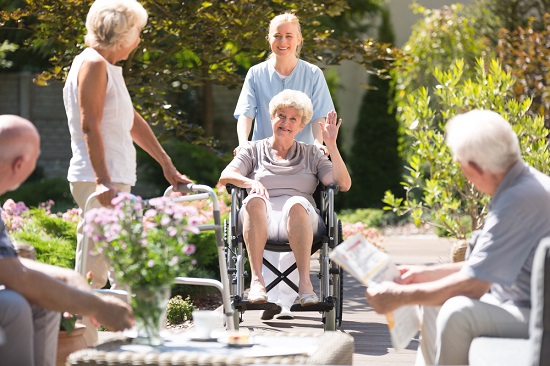
Most people want to live in their own homes for as long as possible. This is how many of our older relatives feel. However, it may not be in their best interest to do so. What can we do to talk to them about the dangers and realities of remaining at home when their functional and/or health abilities are declining? What can we do to convince them of the benefits of assisted living?
The Difference Between Aging in Place and Assisted Living
Some seniors can remain safely at home with professional in-home assistance and a medical alarm system. If they are living alone, or their spouse becomes frail, there is no one who can help them in an emergency. While the familiarity and comforts that come with home are undisputed, there are also some drawbacks to aging at home.
As it becomes harder to leave the home and as friends have mobility problems, elders may find fewer opportunities to meet new people. Some seniors might stop doing household chores like cleaning, cooking and washing laundry. Seniors with cognitive impairment are particularly vulnerable to fraud, forgetting to shut off the kitchen, or even self-neglect.
Seniors who are able to make home modifications and have access to a strong support network and can be realistic about their abilities and health may consider aging in place. Many older adults are not aware of their changing needs and fail to prepare for them. Many older adults may not find the home they have chosen for their final years to be suitable or safe. Their family caregivers often have to run roughshod trying to protect their well-being and keep them safe while also managing their lives.
Many family caregivers see the advantages of assisted living as a way to help their loved ones. All signs indicate that Dad and Mom need it. Your current caregiver duties will only increase as your loved ones age. How do you convince them to consider assisted living? These tips will help your loved one see that assisted living facilities offer the support services they require to be safe, happy and healthy.
Ten Tips to Help a Parent Move to Assisted Living
Place the seed
Do not approach loved ones as if you have already decided for them. Talking to your parents about senior living options and assisted living is a good idea. You can simply tell your parents that there may be other options available to make their lives easier, more comfortable, and safer.
Do your research
The next step is to research nearby assisted living communities and invite them along for a tour. But don’t push it. If they are resistant, you can drop the topic and wait until another day for this step.
You should wait for the “teachable moment”, to appear
Is Mom okay? That can be used as a springboard. You can decide whether to bring up assisted living right away or wait for a while. Perhaps you’ll say, “Wow! That was close.” It was certainly a frightening experience. We might be able to go see the assisted living facility across town once you feel better. We would both be happier if we had someone to help us in the event of something similar. You can trust your instincts about the timing of this event, but you should use it as an opportunity for your loved one to face reality.
For referrals, ask
To find out if someone you know is thriving in an assisted living facility, ask around. It’s a good way to get objective information and narrow your search. Even better, find ALFs where your parents’ friends have already relocated. Your parent will feel much more comfortable if they have a familiar face, just like when you first looked for friends–any kind of friend–in your school class.
Tours available
You can take your parents to an assisted living facility. Demonstrate the positive aspects of ALFs. Don’t make it a big deal and try not to force the subject. If possible, tour more than one and get feedback from your parents. Are they more comfortable in a smaller community? Do they prefer a modern, contemporary style or a more traditional, cozy facility? What was their favorite restaurant’s cuisine? What is the best schedule for outings and activities?
Be sure to highlight the advantages.
Assisted living gives seniors the opportunity to focus on what they really enjoy, and to forget about daily chores. Although there is no need to do any yardwork, they offer gardening services. There are meals available in the dining area, and some apartments have kitchenettes that allow seniors to cook their own meals. You have plenty of space to roam, and there is always someone nearby. Your loved one is the best person you can know, so highlight what they will enjoy.
Allow it to sink in.
Allow your loved one to take some time to think about their present situation and how it may affect their health in the future. Also, reflect upon the information you’ve given them and tour the communities. It is an important decision and requires thoughtful thought.
Schedule a family gathering.
If you have a close family, meet up with them for a casual conversation and let your mom or dad know how great it would be if they made the move. Do not make the move seem forced or pre-arranged. Discuss the situation with everyone concerned and discuss any concerns or fears about moving. Ask a friend, or a doctor to meet with you and discuss the reasons for your move. Sometimes third parties are able to make a difference where the family is failing.
You can’t reason with dementia
Noting the fact that some loved ones with cognitive impairment may not be able to recognize their limits, they might still want to stay at home. There is no one-size fits all solution for moving a dementia patient to assisted living. There is no way to convince someone suffering from Alzheimer’s or other forms of dementia that they will change their minds. While dementia caregivers may resort to pushing the issue in order to make sure their loved ones are safe, well-cared for and happy, the reality is you can’t force seniors to go to assisted living unless the senior is deemed incapable. A power of attorney or guardianship is often required to put an incompetent loved one into the right long-term care environment.
Be patient.
Don’t press unless you are certain that your loved one needs to be placed in an assisted living facility urgently. Try to give your parents the feeling that they have control over their lives. There is nothing you can do if a senior cannot make their own decisions regarding their care. Many caregivers have to wait until a senior is able to decide for themselves.
Transferring elderly parents to assisted living
For some seniors, this whole process may be difficult. Even for those who want to live in assisted living community, it is difficult to leave a home filled with memories. It is also an emotionally charged decision. Try to be kind and sensitive, and make the transition about your parents and not you. While it will be a while before your mom or dad can settle into their new house, they should enjoy the transition.
Call Reflections Assisted Living at Carolina Forest now and let us help if you’re looking for the best facility for your aging parent.
Reflections Assisted Living at Carolina Forest
219 Middleburg Dr
Myrtle Beach, SC 29579
(843) 903-0700
https://www.reflectionsassistedliving.com/







